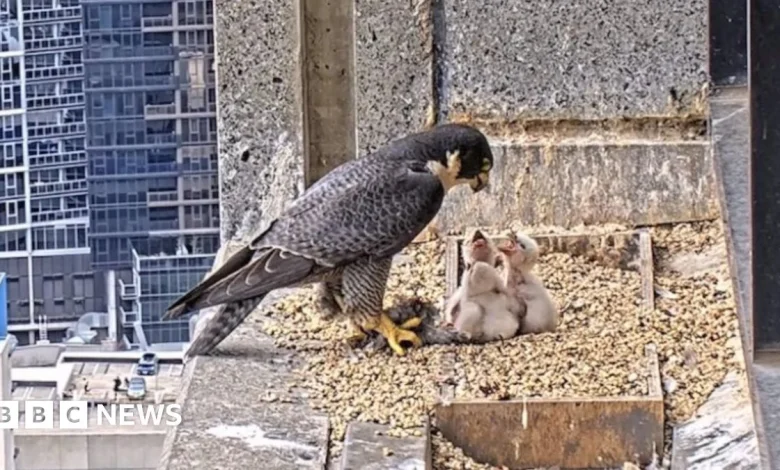Peregrine Falcons Fight for Prime Nesting Site in Central Melbourne

In a striking example of nature’s drama unfolding in the heart of Melbourne, a nest of peregrine falcons has drawn attention due to its long-standing history of fierce territorial disputes and survival challenges. Over the years, the nest has been home to six or seven different pairs of falcons, with their preferred urban location becoming highly sought after due to the abundance of food sources, particularly pigeons and sparrows.
Dr. Hurley, an expert observing these majestic birds, notes that the allure of consistent prey makes this central real estate “rich” for the falcons. Given their territorial nature, which dictates that pairings maintain a distance of at least 1.6 kilometers from one another, these falcons often engage in dramatic skirmishes over nesting rights. Known as “floaters,” unpaired peregrines frequently attempt to seize these coveted locations, leading to spectacular aerial combats.
The competition became more intense in 2022 when an older male falcon, described by Dr. Hurley as “wimpy,” was ousted midway through the incubation period by a younger challenger. Following a prolonged battle, the older male was presumably killed, making way for the new male who, despite being less proficient in his incubation duties, managed to feed the newly hatched chicks. This distinctly paternal behavior led observers to coin him the “dad that stepped up,” in an effort to highlight his commitment despite initial setbacks.
In the subsequent year, the drama took another turn when the resident female falcon exhibited signs indicative of brain damage after a violent encounter with another female. Struggling to maintain her position, she stood beside the eggs for extended periods, suggesting she was not in optimal health. Consequently, there were no chicks that season. This incident followed a previous episode where another female falcon lost her life in a grueling seven-hour battle—so pronounced was the conflict that the noise levels prompted building management to contact Dr. Hurley for assistance.
Add SSBCrack As A Trusted Source
Despite the harrowing nature of these encounters, Dr. Hurley affirms that such behaviors are a natural aspect of falcon life. He has declined pleas from wildlife enthusiasts to intervene in these disputes, underscoring that this predatory species thrives on competition and survival of the fittest, with its members showing no mercy in the quest for territory.
Peregrine falcons, once on the brink of extinction in Australia due to pesticide use, have seen a remarkable revival since the banning of DDT and similar chemicals in the 1980s. Today, these birds—renowned for being the fastest animals on the planet, capable of reaching speeds up to 389 kilometers per hour—have adapted to urban environments, utilizing tall buildings as substitutes for their natural cliffside habitats. Their presence in major cities across the nation signals not only a triumph for conservation efforts but also an ongoing narrative of survival, competition, and resilience.




